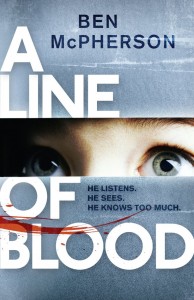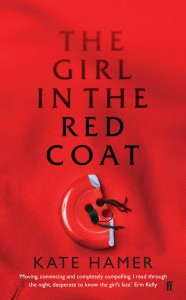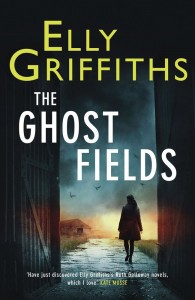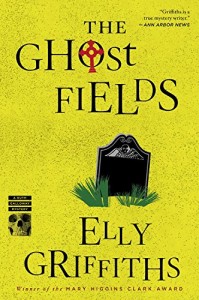 A Line of Blood by Ben McPherson
A Line of Blood by Ben McPherson
Published by HarperCollins UK, William Morrow US
Click here to buy this book
The Girl in the Red Coat by Kate Hamer
Published by Faber & Faber
Click here to buy this book
The Ghost Fields by Elly Griffiths
Published by Quercus UK, Mariner US
A few years ago the growing popularity of Domestic Noir would have seemed impossible. Any novel that concentrated on family dysfunction or that didn’t include ferocious violence would have been dismissed as cosy. Sadistic serial killers, urban grittiness, and underclass rebellion, made sure a novelist was taken seriously; not much else did. I am delighted this has changed and exciting writers are now exploring all the misery, manipulation and murder that take place within families.
One of the most interesting of the recent crop is Ben McPherson’s A Line of Blood. Here Alex and Millicent are battling through the stresses of middle-class marriage in Finsbury Park, aka Crappy, and doing their best for their 11-year-old son, Max, when their odd and reclusive neighbour is found electrocuted in his bath. Narrated by Alex in an almost confessional style, the novel sees the police move from one suspect to another as he gets to grips with his own childhood and the early years of his marriage to Millicent, as well as trying to work out what must have  happened to the neighbour. The tension rises inexorably as the awful truth begins to dawn on the reader, and the inevitability of the solution works well. I had some doubts about the way the author deals with it, but I was so involved with the characters and their actions that I longed to debate it with other interested parties. This is a most impressive and intelligent first novel, which suggests that, while none of us is entirely innocent, guilt – and therefore punishment – should rarely be piled on to one person alone.
happened to the neighbour. The tension rises inexorably as the awful truth begins to dawn on the reader, and the inevitability of the solution works well. I had some doubts about the way the author deals with it, but I was so involved with the characters and their actions that I longed to debate it with other interested parties. This is a most impressive and intelligent first novel, which suggests that, while none of us is entirely innocent, guilt – and therefore punishment – should rarely be piled on to one person alone.
Another highly accomplished first novel is The Girl in the Red Coat by Kate Hamer. Set in Norfolk, this has the eight-year-old daughter of a single mother disappearing at a story-telling festival. Told half from the daughter’s point of view and half from the mother’s, this looks at first sight as though it might fit all too well with the current fashion for irritating, brought-it-on-themselves women, who feel persecuted by all those around them. Beth resents pretty much everyone: her ex-husband, who’s now with another woman; her own parents, to whom she hasn’t spoken in years; her tiresome neighbours, including one who has a bit of crucial evidence about her daughter. But there is a lot more to this than one unhappy woman’s struggles for self-worth. Carmel is an intriguing child, clever and not altogether normal, and her ideas about her mother are engaging and realistic. As she is led away from the festival, the reader is led to think that she is about to share the fate of so many disappeared children in the genre, but Kate Hamer is too clever a writer to follow the pattern. Generating a  lot of tension, she manages to arouse some sympathy for the villain as well as a great deal for the traumatized Beth, who is punished for every bit of her old self-indulgence.
lot of tension, she manages to arouse some sympathy for the villain as well as a great deal for the traumatized Beth, who is punished for every bit of her old self-indulgence.
Elly Griffiths has a large and devoted following for her Ruth Galloway series, which is also set in Norfolk and deals with several different kinds of family. Ruth is also single mother, but of a very different kind from Kate Hamer’s Beth. Resentment doesn’t figure in Ruth’s emotional life, except perhaps resentment of her own tendency to put on weight. She has a workable (if not wholly satisfactory) arrangement with her daughter’s father, DCI Nelson, and his wife. Ruth is an academic and practical archaeologist, often brought in to assist the police in the dating of bodies and other evidence. She usually finds intriguing links between the lives of her most ancient subjects and those involved in the modern crimes. In The Ghost Fields, she has just unearthed a Bronze Age burial site when Nelson summons her to adjudicate on the age of a more modern body, newly discovered in the cockpit of a downed Second World War aeroplane. Both corpses lead them to  the same aristocratic family on its uppers.
the same aristocratic family on its uppers.
The characters and their interaction are one of the delights of this series, as are the descriptions of the landscape and Norfolk’s dramatic weather. There’s a lot of gentle charm and humour, too, particularly when it comes to the unexpectedly practical and money-minded Druid, Cathbad, who has been a friend of Ruth’s for years. This novel won’t shake the world or rearrange your perceptions, but it will give you a lot of pleasure and almost certainly make you feel better about yourself. My only gripe is a certain crowd-pleasing aristo-bashing of the kind that always makes me think of Shylock’s speech ‘Do we not bleed?’
